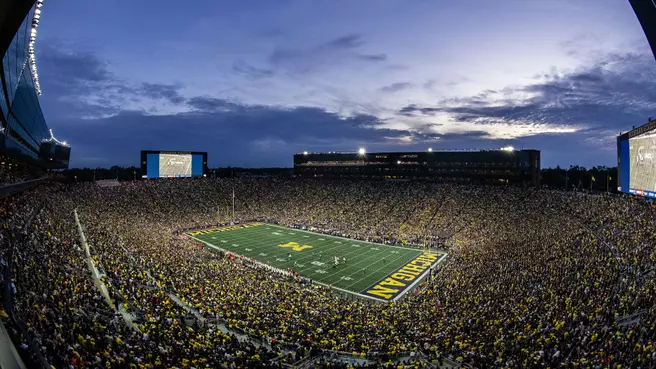
Zero Waste at Michigan Stadium
The University of Michigan Athletic Department has made great strides continuing to strive toward zero waste football game days at Michigan Stadium.
We aspire to divert 90 percent of the waste generated on football game days away from the landfill through recycling, composting and food donations. From the start of the initiative in 2017 through the end of the 2025 season, Michigan Stadium has diverted over 500 tons of waste from landfills. The typical game day diversion rate is between 70-80 percent.
What You Should Know: Zero Waste at Michigan Stadium, Campus Farm
In 2023, the Office of Campus Sustainability, Athletics, and the Campus Farm started piloting the possibility of composting waste from football games at the Campus Farm. This effort continued throughout the 2025 season and represents a new partnership to develop potential solutions to handle U-M’s waste.
The effort supports the campus-wide sustainability effort known as Planet Blue and builds on the more than 20-year history of recycling gameday waste at Michigan Stadium. It directly impacts the university's sustainability goals, specifically the goal to reduce waste sent to landfills by 40 percent and to strengthen the culture of sustainability on campus.
Campus Farm Stadium Compost Pilot Program
The Zero Waste Program at Michigan Stadium
___________________________
KEY STATS
- On a typical game day, Michigan Stadium recycles roughly 9.2 tons, composts almost 4.1 tons and donates a half-ton of food to local food banks. Overall, it diverts 70 to 80 percent of all waste generated on a football gameday from landfills.
- Stadium signage directs fans to both recyclable and compostable material
- Nearly all items sold at concessions stands can be recycled or composted
- Michigan Stadium has been recycling for more than 20 years

comes in Sunday morning at 6 a.m. to sort the trash into recycling and compost?
GAMEDAY
Fans will see signage in Michigan Stadium directing them to containers for both recyclable and compostable material. Nearly all the materials purchased in Michigan Stadium can be recycled or composted. The job of fans is to make sure waste gets into the proper bin.
All recyclable materials should be placed in bins with blue bags and recycling labels, while all compostable materials should be placed in bins with green bags and compost labels.
Sodexo Live, our food service management company, began sourcing and using compostable products and packaging during the 2016 football season to test the durability of the products. Almost all food service items are provided in compostable or recyclable containers, cups or serving trays.
Compostable waste is taken to the City of Ann Arbor’s compost site or the Campus Farm to be sorted. Recyclable waste is taken to the Western Washtenaw Recycling Authority. Fans can help reduce the amount of contamination by placing items in the correct bins.
Additionally, stadium operations staff continue to develop strategies to improve the waste separation process during postgame cleanup efforts.
Unsure what bin something goes in? Look it up here to know where to throw on campus!









